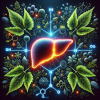Advancements in Hepatoprotective Herbal Medicines Current Trends, Significance and Future Perspectives
Keywords:
Hepatoprotective, Hepatoprotective Herbs, Liver Diseases, Ayurveda , Traditional Medicine, Silymarin, Curcumin, DetoxificationSynopsis
The liver, a central organ in human physiology, is responsible for crucial functions such as detoxification, metabolic regulation, immune surveillance, and homeostasis. Owing to its constant exposure to xenobiotics, pathogens, and metabolic by-products, it remains highly susceptible to damage. Herbal medicines have emerged as promising therapeutic agents in liver protection due to their multifaceted pharmacological actions. A wide range of medicinal plants exhibit hepatoprotective effects through antioxidant, anti-inflammatory, immunomodulatory, antifibrotic, and cytoprotective mechanisms. Phytoconstituents such as silymarin, curcumin, glycyrrhizin, lignans, flavonoids, and polyphenols have demonstrated significant potential in restoring hepatic function and preventing disease progression. These natural agents modulate key molecular pathways, including NF-κB, Nrf2, MAPKs, and PI3K/Akt, thereby reducing oxidative stress, inhibiting inflammatory cytokines, enhancing detoxification enzymes, and protecting mitochondrial integrity. Their applications span a spectrum of liver disorders, including non-alcoholic fatty liver disease, viral hepatitis, autoimmune hepatitis, alcoholic liver damage, and hepatocellular carcinoma. Safety and toxicological assessments highlight the importance of dose standardization, quality control, and monitoring of herb-drug interactions. The integration of traditional systems of medicine, such as Ayurveda, Siddha, and Unani, with contemporary pharmacological research underscores the relevance of holistic approaches to liver care. Advances in drug delivery systems, including nanoformulations and phytosomes, have further enhanced the bioavailability and therapeutic efficacy of herbal agents. A scientific and evidence-based approach to herbal hepatoprotection offers a sustainable pathway toward the development of safe, effective, and integrative liver therapeutics.
Chapters






